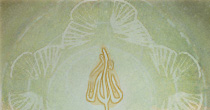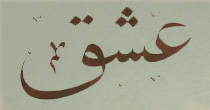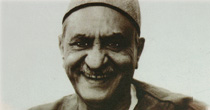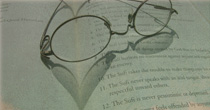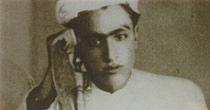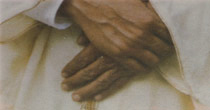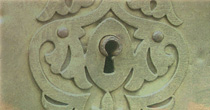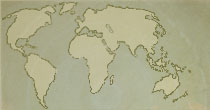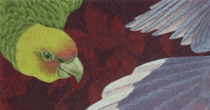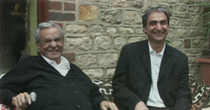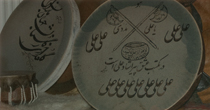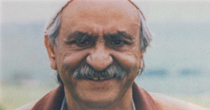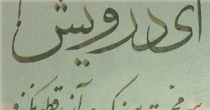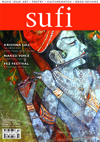Media Library | Writings | Dr. Alireza Nurbakhsh
In Memory of My Dear Father
by Dr. Alireza Nurbakhsh
A Speech Delivered by Alireza Nurbakhsh at a Memorial Ceremony for Dr. Javad Nurbakhsh, Master of the Nimatullahi Sufi Order, in London on October 19, 2008.
I would like to welcome everyone to this gathering to commemorate the death of my dear father, Dr. Javad Nurbakhsh, who passed away last Friday on the lOth of October 2008.
I am not here to talk about my father's worldly achievements, since I assume most of you are already familiar with his life. In any event a short biography is available for everyone here, which I understand has been published by several newspapers across the globe.
My father spent the last 29 years of his life in exile away from his homeland. However, he cared a great deal about Iran and its culture, which according to him is nothing other than Sufism.
In his youth, when he was only 16, he was drawn to Sufism and began his spiritual journey under his master, Mr. Dhu 'r-Riyasatayn at the same time that he was attending medical school at Tehran University. After World War II, Iran, like most traditional societies of the East, was undergoing fundamental cultural changes towards modernity. Science and technology were being actively promoted among the youth as the only direction for the country. Iranian intellectuals at the time tended to look down on Sufism, which they saw as backward and incompatible with a progressive, scientific outlook. For them Sufism was associated with idleness, begging, seclusion and in general being parasitic to society. And I must admit that from a historical perspective such a perception of Sufism at the time was not far from the truth.
My father was one of the few people in that era who did not see any incompatibility between modernity and the scientific outlook, on the one hand, and Sufism on the Other. His interpretation of Sufism was radically different from that of his contemporaries, who could only see Sufism as an aspect of esoteric Islam and nothing more. By radical interpretation of Sufism, I mean the fact that he viewed Persian Sufism as essentially a human enterprise, one that could neutralize and combat the dry and at times harsh aspects of exoteric Islam.
Time and again he has defined Sufism as a journey from one's ego towards the Truth with the aid of love and loving-kindness. Sufism for him is a way for human beings to transform their gross material nature into a higher, spiritual form of being, thereby manifesting loving-kindness towards all. He never considered Sufism as an intellectual activity confined to elaborating esoteric concepts such as annihilation or detachment from the world. For him such concepts could be 'understood' only when one embarks on the spiritual journey towards God.
His school of Sufism is a revival of Persian Sufism based on love as practiced in the northeastern frontier of Iran in greater Khurasan. The classical period of this development was from the 9th to the llth centuries A.D. He considered people like Bayazid Bastami, Abu'l-Husayn Nuri Khurasan, Abu'l-Hasan Kharaqani, Abu-Sa'id ibn Abi'l-Khayr and Abu'l-Abbas Qassab Amuli to be the pioneers of true Sufism.
This school of Sufism is based on three fundamental principles, which he put into practice all his life.
The first principle is 'nothingness', whereby one's actions are not based on one's ego. Only people who have annihilated themselves in God can achieve this, for he who is in love with the Beloved has no news of himself. As my father writes in one of his poems:
Nurbakhsh left the district of 'I and you'
And he has settled in the sanctuary of the heart.
I remember a story that he told me when I was very young and that I later found written down on a piece of paper in his own handwriting. The story is not without humor and is a good example of how he dealt with people who could not see beyond themselves. At the age of 27, when he became the Master of the Nimatullahi Order, he was invited by the Sufis in Kermanshah, a city in western Iran where my father's master was buried, to go for a visit. Although he was a medical doctor at the time, he did not have much money and could only afford a bus ticket. His one and only suit was worn out and dusty. In the bus he sat next to a high school teacher who was a very proud man and looked down on my father because of his appearance. After a while, the teacher became bored and decided to start a conversation with my father. He asked my father, "What do you do, boy?" "I am a tailor in Kermanshah", replied my father. "Why then did you go to Tehran?" asked the teacher. "Because, I wanted to know about fashion to improve my business" replied my father. He continued to answer the teacher's questions in a similar vein until they reached a city near Kermanshah where a large crowd of Sufis, aware of his coming, had blocked the road in order to welcome him. At this point the teacher turned to my father and said that these people surely were mistaken since as far as he could see there was no one important in the bus. My father said nothing. Then a group of Sufis got on the bus and threw themselves at him. Seeing the teacher's astonishment at what was happening, my father turned to the teacher and said, "I swear they have got the wrong man!"
The second principle is service to humanity. From the day he enrolled in medical school until the day he died he served everyone irrespective of whether they were Sufis or not and without any expectation of anything in return. I remember once a Sufi who was visiting him told him of a certain individual who was criticizing him and the rest of the Sufis. In response my father expressed surprise at what he was hearing because he had never shown any kindness to this man. The man was astonished at this remark. Then my father explained that in his experience only those for whom he had done a favor retaliated with harshness.
The third principle is love towards God. By God my father did not mean an anthropomorphic entity that has human qualities and is man-made. God for him is the ineffable Absolute Being, and the whole universe is a manifestation of that Being. Time and again he would refer to the principle of 'Unity of Being' that can only be discovered through the heart and not through one's reason. As everything is a manifestation of God, to love God is to love God's creatures and His entire creation.
My father was dismayed by religious fundamentalism, the growth of which he witnessed when he left Iran 29 years ago. For him, man's ego is the cause of most calamities, including that of religious fanaticism. I share this belief.
My father, Nur 'Ali Shah Kermani, passed the cloak of mastership to me. This is a great honor and responsibility, and I will strive to wear this cloak with the humility and generosity of spirit with which my father wore it. I do not believe that there is a path more beautiful or more profound than the one that he practiced all his life. By God's grace I will continue my father's work with love and in service to humanity, and I invite all of you to join me in honoring his life.
Alireza Nurbakhsh
19 October 2008
Article taken from Sufi Journal, Issue 76
Other Writings by Dr. Alireza Nurbakhsh
-
Friendship
The Sufis refer to God as the Friend (dūst). This is based on the Koranic verse yuhibbuhum wa yuhibbuhunah (God loves them and they love Him, 5:45), which is interpreted by the Sufis as meaning that it is God’s love for us that gives rise to our love for Him.
Read more -
Divine Love
The first time I read Rumi's story of Moses and the Shepherd, I was struck by the fact that the shepherd was much closer to God than Moses even though the shepherd's conception of God was not even remotely plausible. Years later, when I revisited this story, it appeared to me that Rumi had unravelled a deep mystery of divine love: in order to love God, one does not need to have a correct conception or description of God; what is required is a burning heart.
Read more -
The Meaning of Surrender
The first step on the path of Sufism is to surrender oneself to God. True surrender is not a self-conscious decision carried out as a result of a series of deliberations. It usually happens after years of frustration in finding the 'right' way to manage our lives, the right way to deal with others or to control our self-destructive behavior.
Read more -
The Master Disciple Relationship Revisited
The relationship between a master and a disciple has often been characterized in Sufism as that of unwavering trust, where the disciple follows the master without asking questions or raising objections in his or her journey towards the truth.
Read more -
The Experience of Nothingness
When I was about 13 years old, I was allowed to sit outside the main gathering place of the Sufis where my father conducted weekly meetings and the occasional vocal zekr. I don't quite remember the first time I sat outside the room listening to the vocal zekr, but I do distinctly remember the fir st time I heard my father utter these words: "Ilahi 'ajz wa inkesar, wa nisti 'ata befarma" (0 Lord grant us [the state of] helplessness, abjectness and nothingness).
Read more



